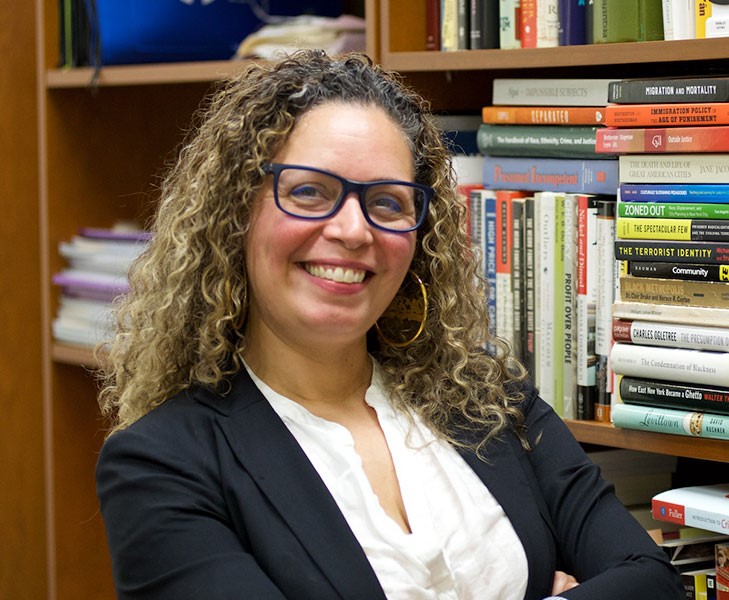Shirley P. Leyro

Associate Professor
Social Sciences, Human Services and Criminal Justice
EMAIL: sleyro@bmcc.cuny.edu
Office: N-656
Office Hours:
Phone: +1 (212) 220-8000;ext=5127
Born in the Bronx, Shirley Leyro was raised in the Castle Hill Projects. She earned her Ph.D. and is an Associate Professor of Criminal Justice at Borough of Manhattan Community College – CUNY. A critical criminologist, Dr. Leyro’s research focuses on deportation effects – including the impact of fear resulting from the vulnerability to deportation. Her research interests include immigration, deportation, social disorganization, crimmigration, and the impact of all the above on mental health. Dr. Leyro has a background in organizing and activism, focused around immigration and immigrant rights, in particular: issues surrounding immigration enforcement and the criminalization of immigrants. As a result of her research findings, she became a Mental Health First Aid Instructor and collaborated with the New York City Department of Health and Mental Hygiene to give MHFA certification trainings across the City. Dr. Leyro is widely published, and has spoken about her research at various colleges, universities, and other institutions around the country.
Expertise
Social Justice Issues, Policy advocacy, Immigrant Health, Deviance, Critical Criminology, Criminology
Degrees
- Ph.D. The Graduate Center – CUNY, Criminal Justice,
- M.A. John Jay College of Criminal Justice, Criminal Justice, 2003
Courses Taught
- Criminal Justice is the field that studies formal social control. This course covers the processing of crime by agents of formal control (police, courts, and institutional corrections). The general focus is on understanding the complex interactions of structures and agents in the system. Of particular concern are discretion and diversity in law enforcement, due process in criminal courts, and the punishment-rehabilitation dichotomy in corrections. The ultimate goal is to provide a critical foundation that prepares students for the challenges of a career in criminal justice.
- This is an introductory and foundational course in the study of crime and justice. It is designed to introduce students to the various historical and contemporary theories and empirical research used to understand deviant and criminal behavior. This course takes a critical approach to the study of the definition and measurement of crime, as well as applications of these theories to practice and in policy. Offending and victimization, as these relate to specific crime types (i.e., white collar crime, violent crime, sex crime, drug related crimes, etc.) will be explored. Prerequisite: SOC 100
- This course is intended to broaden the studenta??s understanding of the origins and development of law enforcement agencies in the United States. Moreover, the course will examine the complex role of the police in a democratic society in the criminal justice system. An emphasis will be placed on recruitment, the training process and the importance of diversity, particularly among larger police departments in the U.S. The course will also examine contemporary legal issues and modern strategies such as community, evidence-based, intelligence-led and predictive policing. Prerequisite: CRJ 101
- This course examines the history of criminal punishment in Western society, emphasizing the United States. The course highlights social forces (political, religious, economic, and technological) shaping punishment; reviews common theories (deterrence, retribution, rehabilitation, incapacitation, and restoration) and examines how theory relates to policy. The course takes a critical approach to correctional systems and policies by considering disparities and structural inequalities. Empirical evidence is used to examine contemporary crises of punishment (i.e., mass incarceration, school-to-prison pipeline) as well as prison culture, staffing, privatization, and prisoner civil rights. Alternatives to traditional punishment, especially restorative justice models, are explored. Prerequisite: CRJ 101
- This is an introductory course in the study of criminal law. The focus is on how it functions in and affects modern society, with a particular emphasis on understanding both the objectives and the limitations of law as an apparatus of social control. This course will cover the principles underlying the definition of crime, the purpose of punishment, and the general doctrines, such as attempt, causation and conspiracy. Throughout the course, a review of U.S. Supreme Court ruling and their role in the evolving nature of theory of criminal law will also be covered. Prerequisite: CRJ 101
- This course takes a critical approach to the study of crime and justice in urban settings. Course materials examine contemporary crime-related issues that affect urban communities within a historical and sociological context. The course highlights the intersections of deviant behavior and the criminal justice system within the structures of class, race, gender, and power inequalities. Topics explored may include racial profiling, juvenile delinquency, media representations of crime, policing, the war on drugs, and prisoner re-entry.
Prerequisite: CRJ 101 and CRJ 102
Research and Projects
Publications
Colleen Eren, Ilir Disha & Shirley Leyro (2019, in print). “Family and Friends in Uniform: CJ students’ networks, choice of major and career aspirations.” Dialogues in Social Justice: An Adult Education Journal.
Colleen Eren, Shirley Leyro, & Ilir Disha (2019). “It’s personal: The impact of victimization on motivations and career interests among criminal justice majors at diverse urban colleges.” Journal of Criminal Justice Education. https://www.tandfonline.com/doi/full/10.1080/10511253.2019.1612931
Shirley Leyro & Daniel Stageman (2018). Crimmigration, deportability and the social exclusion on of noncitizen immigrants. Migration Letters, 15(2), pp. 255-266. https://academicworks.cuny.edu/cgi/viewcontent.cgi?article=1227&context=jj_pubs
Honors, Awards and Affiliations
2019 – CUNY Faculty Fellow – Sponsored by the Center for Place, Culture, Politics—The Graduate Center (CUNY)
2019 – Faculty Fellowship Publication Program – Sponsored by the Office of the Dean for Recruitment and Diversity (CUNY)
2017 – Certified Instructor – Mental Health First Aid.
2017 – Diploma in International Critical Criminology, Common Study Ptogramme in Critical Criminology. Defense of Dissertation at the Common Sessions at John Jay College, New York, NY. Review Committee: Richard Staring (Erasmus University Rotterdam), Christine Hentschel (University of Hamburg), Olga Petintseva (Ghent University).

